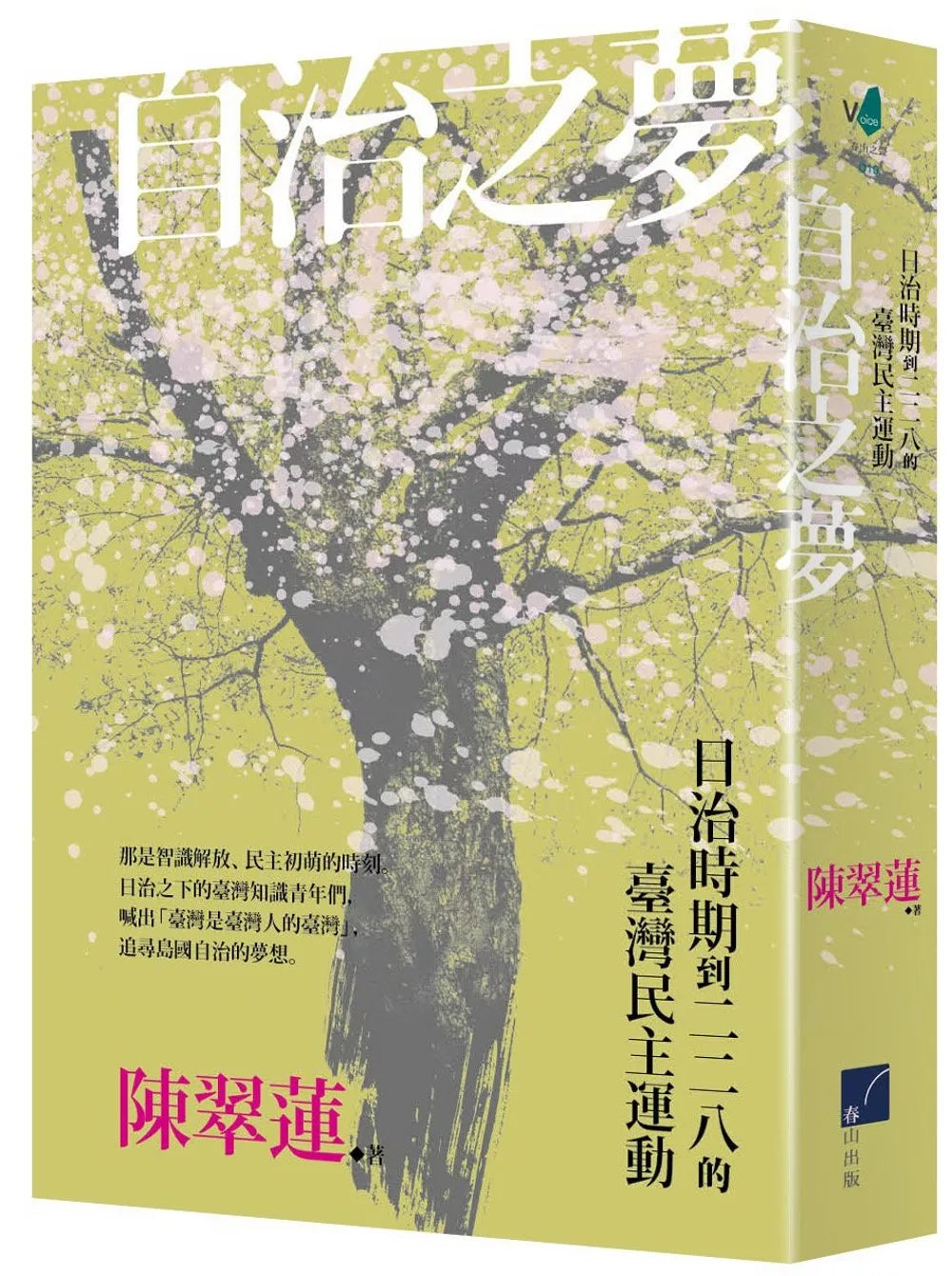1
/
of
1
The Dream of Autonomy: Taiwan's Democratic Movement from the Japanese Occupation to the February 28 Incident
The Dream of Autonomy: Taiwan's Democratic Movement from the Japanese Occupation to the February 28 Incident
Chen Cuilian
Regular price
$23.99 USD
Regular price
Sale price
$23.99 USD
Unit price
/
per
Low stock
Couldn't load pickup availability
About Book
About Book
☆★A Tribute to the Pioneers of Taiwan's Democratic Movement in the 1920s☆★
#This book was originally titled "A Century of Pursuit, Volume 1: The Dream of Autonomy"
That was a time of intellectual liberation and the beginnings of democracy;
Under Japanese rule, young intellectuals in Taiwan
Shouting "Taiwan belongs to the Taiwanese" and pursuing the dream of island autonomy.
In an era of harsh oppression, a small number of people, regardless of their own personal interests, bravely stood up to resist. Although this wave of democratic movement suffered a heavy blow and failed to achieve its goal of transforming Taiwanese society, the courage and efforts of our predecessors are enough to give us confidence and prevent us from becoming pessimistic and dejected. The democratic movement during the Japanese colonial period also reminds us that active public participation and dedication to the collective are noble virtues... These brave people who dedicated themselves to the public should become role models, be known by the public, and become the common memory of Taiwanese society. - Chen Cuilian
During the Taisho era of the 1920s, the spirit of liberation influenced young people across Asia. At a time when literacy rates in Taiwan were only 3.9%, Taiwanese students studying in Japan, including Cai Peihuo, Lin Chenglu, and Lin Zhongshu, proclaimed, "Taiwan belongs to the Taiwanese." They collaborated with Taiwanese officials like Lin Xiantang and Jiang Weishui to establish the Taiwan Cultural Association and launch a petition campaign for the establishment of a Taiwanese parliament. Through this cultural movement, they disseminated new values and theories to enlighten the public. They also established political parties, leveraging their organizational power to demand democracy and the right to participate in government.
Despite internal struggles over policy and ideologies, and external tightening and repression from rulers, and later the pressures of war and the shifting East Asian order, as well as the relentless devastation inflicted by the new rulers after World War II, the nearly three decades from 1920 to 1947 can be described as Taiwan's Age of Enlightenment. The sense of "Taiwanese" took shape during this period, and an understanding of concepts like freedom, democracy, human rights, and autonomy gradually took root, becoming shared pursuits.
Although the dream of autonomy has faded like a blooming flower, the figures of those pioneers and the beautiful pictures they painted of Taiwan's future continue to inspire those who come after them. Even though the road ahead is still full of thorns and obstacles, people can continue to move forward for a free, democratic, and just Taiwan.
#This book was originally titled "A Century of Pursuit, Volume 1: The Dream of Autonomy"
That was a time of intellectual liberation and the beginnings of democracy;
Under Japanese rule, young intellectuals in Taiwan
Shouting "Taiwan belongs to the Taiwanese" and pursuing the dream of island autonomy.
In an era of harsh oppression, a small number of people, regardless of their own personal interests, bravely stood up to resist. Although this wave of democratic movement suffered a heavy blow and failed to achieve its goal of transforming Taiwanese society, the courage and efforts of our predecessors are enough to give us confidence and prevent us from becoming pessimistic and dejected. The democratic movement during the Japanese colonial period also reminds us that active public participation and dedication to the collective are noble virtues... These brave people who dedicated themselves to the public should become role models, be known by the public, and become the common memory of Taiwanese society. - Chen Cuilian
During the Taisho era of the 1920s, the spirit of liberation influenced young people across Asia. At a time when literacy rates in Taiwan were only 3.9%, Taiwanese students studying in Japan, including Cai Peihuo, Lin Chenglu, and Lin Zhongshu, proclaimed, "Taiwan belongs to the Taiwanese." They collaborated with Taiwanese officials like Lin Xiantang and Jiang Weishui to establish the Taiwan Cultural Association and launch a petition campaign for the establishment of a Taiwanese parliament. Through this cultural movement, they disseminated new values and theories to enlighten the public. They also established political parties, leveraging their organizational power to demand democracy and the right to participate in government.
Despite internal struggles over policy and ideologies, and external tightening and repression from rulers, and later the pressures of war and the shifting East Asian order, as well as the relentless devastation inflicted by the new rulers after World War II, the nearly three decades from 1920 to 1947 can be described as Taiwan's Age of Enlightenment. The sense of "Taiwanese" took shape during this period, and an understanding of concepts like freedom, democracy, human rights, and autonomy gradually took root, becoming shared pursuits.
Although the dream of autonomy has faded like a blooming flower, the figures of those pioneers and the beautiful pictures they painted of Taiwan's future continue to inspire those who come after them. Even though the road ahead is still full of thorns and obstacles, people can continue to move forward for a free, democratic, and just Taiwan.
Publication Date
Publication Date
2020-08-04
Publisher
Publisher
春山出版
Imprint
Imprint
Pages
Pages
344
ISBN
ISBN
9789869907255
share

